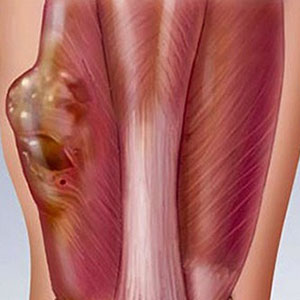What is Sarcoma?
Sarcoma is a kind of cancer that can form in any location of the body and usually originates in the bone or soft tissues of the body called as soft tissue sarcoma. This could be the tissues that support and connects the structures of the body like nerves, tendons, ligaments or the bone lining. Currently, there are more than 70 known types of sarcoma.
What are the types of Sarcoma?
Few types of sarcoma, depending on the origin and location of the cancer are:
- Angiosarcoma: The kind that affects the lymph vessels.
- Gastrointestinal stromal tumor: Affects the neurological or muscular cells of the digestive tract.
- Liposarcoma: Starts in the fat tissues usually around the thigh or behind the knee.
- Leiomyosarcoma: This is found near the abdomen or organ walls.
- Synovial sarcoma: Stem cell tumors are called synovial sarcoma.
- Neurofibrosarcoma: The lining that encapsulates the nerves are affected in this kind.
- Rhabdomyosarcoma: Affects the skeletal muscles.
- Fibrosarcomas: Cells of the connective tissues are affected.
- Myxofibrosarcoma: Frequently found in the extremities or limbs of adults connective tissue.
- Mesenchymomas: These are a mix of the types of sarcoma and can originate at any part.
- Vascular sarcoma: These affect the blood vessels.
- Schwannoma: Nerve covering tissues are frequently affected in this kind of sarcoma.
- Kaposi’s sarcoma: Usually seen in the skin.

Are there any symptoms of Sarcoma?
There could be few subtle signs of Sarcoma, such as:
- A lump which may or may not be painful.
- Frequent break of bones.
- Loss of weight.
- Pain in the midsection or abdomen.
- Limb or bone pain.
Who is at a higher risk of being affected by Sarcoma?
- Genetics: Some sarcoma causing syndromes can be passed genetically.
- Radiation Therapy: Having had radiation therapy for any cancer treatment can increase the risk.
- Lymphedema: When lymph fluid is gathered due to block in lymph vessels and this in turn causes a swelling.
- Chemicals: Exposure to certain kinds of chemicals such as herbicides can increase the risk of liver sarcoma.
How is Sarcoma diagnosed?
A group of diagnostic tests can be done to detect the presence and type of Sarcoma:
- CT Scan
- MRI Scan
- Bone Scan
- Biopsy
- PET Scan
What are the treatment options for Sarcoma?
Depending on the type of Sarcoma and its stage and spread, treatment plan will be set out by the specialist. These could include:
- Chemotherapy.
- Radiation Therapy
- Surgery.
- Targeted Therapies.
Unlike other cancers, there are hardly any lifestyle changes which can help reduce the risk of being diagnosed with Sarcoma. However, the scope of treatment and success rate is pretty high when the sarcoma is still in its primary location or its origin point.









